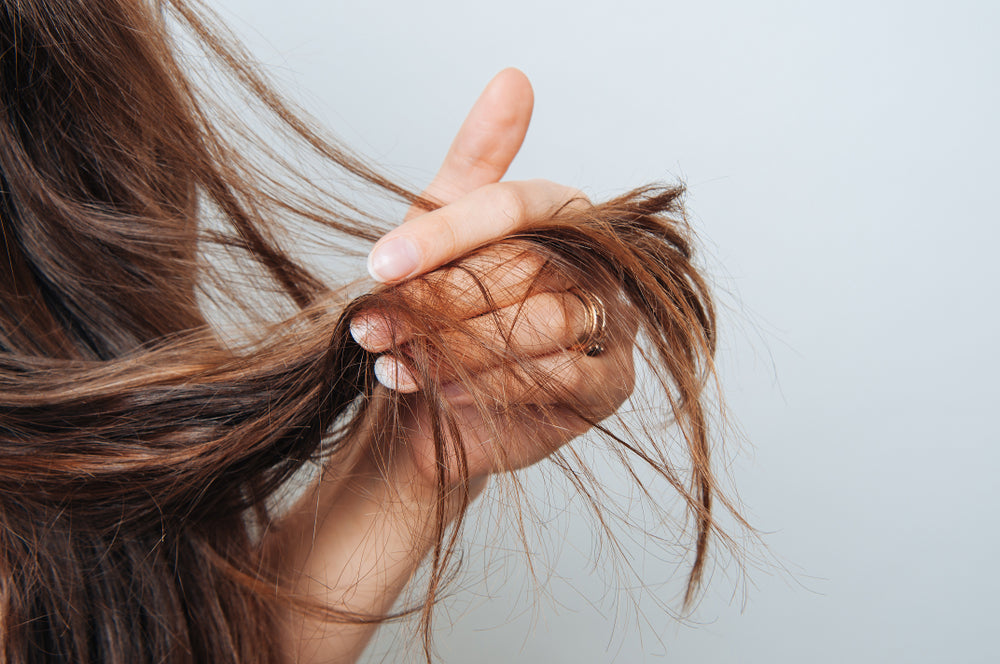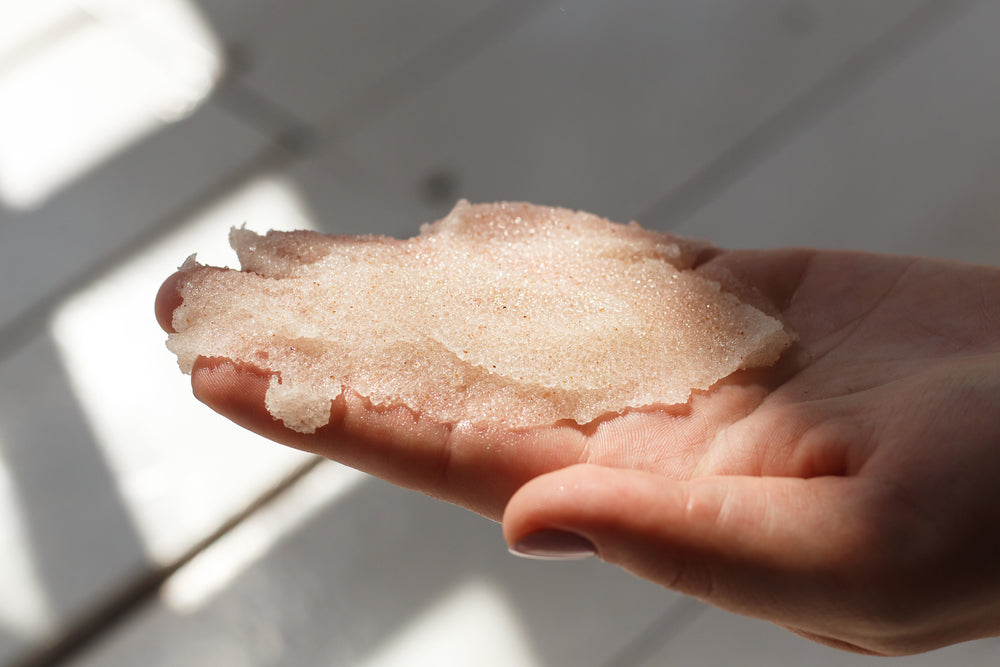A dry scalp affects a surprising amount of individuals, causing mild discomfort and itchiness as well as frustration. If you feel like you’ve been unable to find a solution, this article can help you. I suffered first-hand from scalp inflammation and dryness, and this article combines my tips and suggestions for overcoming scalp dryness with natural oils. Let’s look at how oil treatments can help moisturise and nourish your scalp and revitalise your hair.

Dry Scalp and Its Causes
A dry scalp occurs because it’s unable to produce or retain moisture, essentially leading to dry, flaky and irritated patches of skin. Here are some underlying factors that could cause dryness on your scalp:
Weather and Climate: Environmental factors can also significantly affect scalp health. For instance, colder climates and dry winter months can zap the moisture from your scalp and cause flakiness. Likewise, excessive sun exposure or central heating can also dehydrate your skin and scalp.
Hormonal Imbalances and Medical Conditions: Hormonal fluctuations, particularly during menopause, menstruation, pregnancy or thyroid disorders, can also affect the scalp, hair and skin. Also, particular medications or medical conditions may affect the skin and scalp, leading to dryness as a side effect.
Lack of Hydration and Poor Diet: Nourishing your body from the inside is essential to maintain healthy skin and hair, so our diet can affect our scalps’ dryness levels. If our diets lack crucial vitamins or fatty acids that contribute to our skin’s moisture, we may find increased dry patches on our bodies.
Benefits of Using Oil on a Dry Scalp
These are some of the main benefits of using oil for dry scalp:
Deep Hydration: Oils are natural emollients, which means they provide a barrier on the scalp against the elements, protecting it against moisture loss. What’s more, natural oils such as coconut or almond reach deeper layers of the skin, allowing key nutrients to reach your hair follicles.
Soothing Properties: Dry scalp often goes hand in hand with other symptoms like itchiness and inflammation, but applying a natural scalp oil can provide some relief. Most oils have soothing properties that can help to lessen redness, calm itchiness, and reduce discomfort. Plus, natural oils don’t contain harsh fragrances or substances that can cause more dryness or irritation.
Intense Nourishment: Oils are rich in minerals and vitamins that can feed the scalp with what it needs to heal. For example, many oils contain fatty acids such as omega-3s which can support your scalp’s barrier function and improve its moisture levels.
Choosing the Right Scalp Oil for Dryness
Choosing an oil can seem overwhelming since there are so many to choose from, and each has different benefits. That’s why we’ve simplified it with a list of the most common and readily available oils for scalp dryness:
Argan Oil: This oil is full of antioxidants, fatty acids and vitamin E, making it a potent remedy for dryness. It can soften rough or dry areas on the scalp and provides intense moisturisation and nourishment for the hair.
Jojoba Oil: Jojoba is favourite among many because its composition and consistency resemble the scalp’s natural sebum. This makes it very effective at balancing the scalp’s oil production. Jojoba oil is also non-greasy and rich in nutrients that can improve and support scalp health.
Olive Oil: Olive oil is a kitchen staple for many, but it’s also a natural emollient that can protect and hydrate the scalp. This oil can lessen dry patches while strengthening your hair strands and adding shine.

Factors to Consider When Selecting an Oil
There are a few things to consider when choosing an oil for your scalp. For instance, it’s good to understand your personal hair type, as this will affect how much moisture you need. If your hair is dense, curly or coily, you may need richer and thicker oils to penetrate the scalp and nourish your hair.
After getting to know your hair, it’s important to understand your scalp. If your scalp is extremely dry, it’s best to look for a more intensive oil to combat flakiness and dryness. But soothing and lightweight oils might benefit you more if your scalp tends to be irritated or inflamed. Also, take into account any allergies, scalp conditions or sensitives.
Preparing and Applying Scalp Oil
Preparing a scalp oil doesn’t have to be complicated, so here’s a tried and tested step-by-step guide to help you create and apply your own oil:
Step 1: Select the right oil for your individual scalp and hair needs. Look out for high-quality and unrefined oils, as they contain more natural vitamins and nutrients.
Step 2: If your oil is solid at room temperature, such as coconut oil, warm it up to melt it. It’s best to avoid direct heat, such as a microwave, which can ruin its beneficial properties. Instead, place it in a bowl of hot water. Once your oil is in a liquid state, you can even apply a few drops of essential oil for an extra boost of nutrients.
Step 3: Section your hair with hair bands or clips, and start to apply the oil directly to the scalp. You can use a dropper tool or simply your fingertips. While doing this, pay attention to problem areas and dry patches.
Step 4: Massage your scalp with your fingertips or s soft-bristled brush in circular motions. You can apply a small amount of pressure and gently rub your scalp, helping you relax while distributing the oil.
Step 5: After massaging your scalp, it’s essential to give it time to absorb the oil. We recommend leaving it on for at least an hour, but for best results, wrap your hair in a satin scarf or bonnet and leave it overnight.
Step 6: Wash out the oil with a gentle, natural shampoo that won’t strip away your scalp's natural oils. Also, avoid using very hot water, which can dry out the scalp - instead, opt for warm or lukewarm water.
Using Scalp Oil in Your Routine
When incorporating a scalp oil into your routine, paying attention to your needs and how your scalp reacts is vital. For example, if you know your scalp goes through periods of dryness and oiliness, then using a scalp oil every fortnight or month may be enough. However, if you’re dealing with a scalp condition causing extreme dryness or itchiness, you might prefer to apply oil once or twice a week.
Some find it helpful to start off applying a scalp oil once a week and then adjusting the frequency depending on how their scalp feels afterwards.

Managing Itchy Scalp and Flakiness
Dryness isn’t the only scalp issue people face - flakes and mild to severe itching often accompany it. And sometimes, itchiness can create a neverending cycle of scratching, dryness and flakiness. If this sounds familiar, please don’t despair. Even though it’s extremely frustrating, there are some natural methods that can help you manage an itchy, flaky scalp.
One tip for combating flakes is exfoliating the scalp. Often, our scalp can become loaded with products and dead skin cells, making it itchy and dry. So, using a gentle exfoliator can remove dirt and build-up without causing irritation, allowing your scalp to breathe and accept moisture more easily. Likewise, using a dry scalp treatment to moisturise the scalp is another way to reduce flakiness and itchiness. Combining natural oils with essential oils like tea tree can soothe itchiness and soften flaky patches, leading to a healthier scalp.
Combating dryness can be a challenge, but regularly using oil can be a really effective way to help your scalp heal. Additionally, our intensive scalp oil is designed to fight against dryness and irritation, helping you revitalise your scalp and hair. Learn how our natural haircare range has helped our customers soothe and overcome their scalp troubles by reading our reviews.